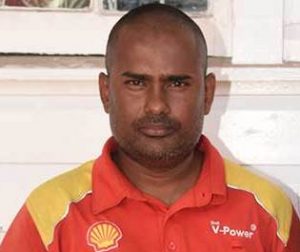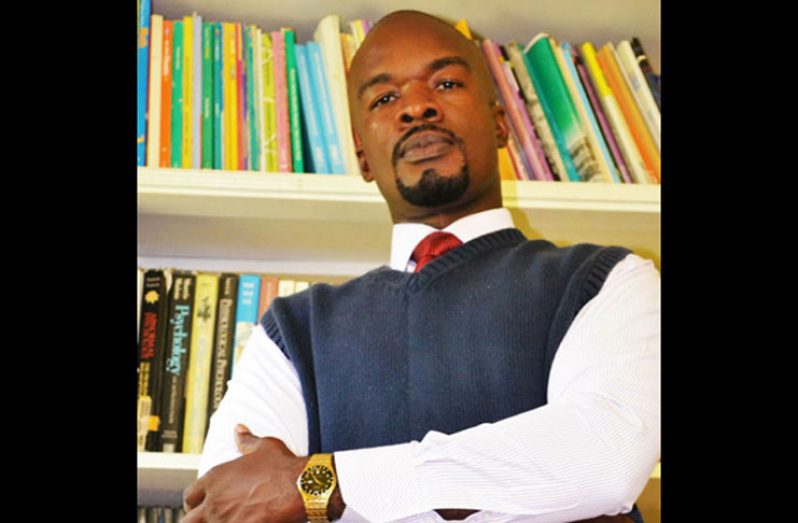— and it will go a long way in addressing domestic violence, psychologists say
PSYCHOLOGIST and University of Guyana (UG) lecturer, Wil Campbell, said while there is no single solution to domestic violence, proper socialisation of males can go a long way in addressing the problem.
Campbell expressed this view in the aftermath of the recent murder of Zaila Sugrim, a mother of five, by her ex-husband Ryan Sugrim.
She reportedly suffered some 15 years of abuse at the hands of Ryan before he eventually killed her and dumped her body in a shallow grave at Crane, West Coast Demerara (WCD), next to the gas station where he worked.

Almost a week after Zaila Sugrim was killed; Farida Khayum, a mother of six, of Anna Regina, Essequibo Coast was stabbed to death by her reputed husband.
After committing the heinous crime, the suspect, Devanand Narine reportedly ingested a poisonous substance and succumbed.
“Men and boys are socialised to think that the only masculine emotion is anger, so boys grow up not knowing how to properly express other emotions. As such, every negative emotion felt is channelled through anger,” he explained.
He added: “If we feel frustrated, sad or jealous, we lash out in anger and any other unpleasant emotion is expressed through anger because the socialisation teaches that to express hurt, sadness and jealously is effeminate but anger is masculine and sexy.”
As such, the psychologist said boys and men usually operate on anger which is their default whenever a negative emotion is experienced.
Another challenge, he said, was that men view themselves as being leaders of their home, along with the expectations of society.
The psychologist said many men mistake this to mean that they should dominate the other members of their family.
DOMINANCE

“So men try to establish dominance over women, they try to establish dominance over children so that what they say, must go to the point where the women are not even given a voice in things that affect them; women are not seen as equal and that is another negative factor in our socialisation that breeds domestic violence and abuse in families,” Campbell said.
The psychologist said in the case of law enforcement and the judicial system where an abuser is successfully prosecuted, that person is usually incarcerated for a given period then released and nothing is done to rehabilitate that person.
“In a lot of these cases, the court could issue restraining orders or probationary sentences on the provision that the person undergo treatment and anger management therapy by approved therapists,” he said.
Adding that the law allows for alternative sentencing in certain cases, the psychologist said even if it does not, sentencing should include a rehabilitative component to the satisfaction of the court before the accused is freed.
“That way, when that person is released and goes home, he doesn’t go home with the anger, because being incarcerated does nothing to resolve anger management issues, if anything, incarceration exacerbates anger because of the conditions existing in our prisons and because of the nature of incarceration in itself, so we have to use more creative sentencing measures,” he said.
Men prosecuted and convicted of domestic violence, he noted, must seek treatment since returning to society with the same social and psycho-emotional issues they went into prison with, will only continue the negative cycle.
IMMUNE
Adding her voice to the matter, Sociologist Patricia Sheerattan-Bisnauth said based on her experience, Guyanese have become immune to the various issues of domestic violence.
She explained that domestic violence is trivialised, justified and murder occurs when women attempt to leave or have left the relationship to seek a better life.
“In Guyana, a lot of initiatives to address domestic violence have been done but are they working? We don’t have a track record although there were many workshops, numerous consultations that has brought about awareness and advocacy, especially in the media,” she said.
The sociologist said women who are faced with violence live in traumatising situations and many expect them to behave normal and live a normal life.
“One day a woman can make up her mind and leave such a relationship but not many women are able to do such,” she said.
She said women have to face tremendous hurdles in escaping domestic violence that may later result in murder.
“In the last 30 years, what has been done at the State level of governance? Have we seen a movement in strategies and in plans to address the same situations which are happening over and over again?” the sociologist asked.
Adding that the laws are there but poor implementation and enforcement stymied the process, she said justice is important for healing, along with the support systems being offered for women who need it.
“We need to review the implementation of the Domestic Violence Act since we still have law bearers who operate with personal beliefs and values, especially the perpetuation of men being seen as the one who disciplines the family,” she said.
Sheerattan-Bisnauth, who is also a pastor, said gender education and positive socialisation of children are pivotal in how the next generation will understand the perpetration of violence against women.
She said many women do not even acknowledge the many forms of domestic violence such as intimidation, control and physical, sexual, emotional, verbal and economic abuse.
“Every service provider should learn counselling skills for both women and men so that screening can be done in search of domestic violence,” she noted.
UNSAVOURY CONNECTION

The sociologist also said there is a connection between sexual health and gender- based violence because men suffer sexual issues which are normal but society looks at masculinity in a way that can be devastating for men.
“These things can put a lot of pressure and burden on men and the health institutions have a big role to play, along with community systems and institutions,” she said.
Additionally, the pastor said community leaders can exacerbate issues of domestic violence by feeding into stereotypes of dominance and abuse in family relationships by trivialising the issues.
Underscoring that when such issues are brought to the attention of service providers and leaders, there is need for mandatory counselling, Sheerattan-Bisnauth said. Grenada has a system for mandatory counselling of men and the results can be seen in the society’s development.
“There is more to men than seeing them as the perpetrator; there is need for justice and accountability, but I do believe more emphasis needs to be placed on men as part of the solution and not only the problem,” she emphasised.
Importantly, she said more family violence counselling and support programmes are needed.
However, the former Executive Director of the Guyana Responsible Parenthood Association (GRPA) questioned the amount of investment Guyana, its leaders and society have placed in finding solutions to the root cause of the problem.
“I was also attached to the health sector and several persons have come to me and said that they went to the hospital with a child who was raped and the girl at the desk would say ‘you cannot send your bread winner to jail’, causing women to run back and hide as a result of being scared and fearful,” she said.
She said this kind of behaviour is found in all sectors of society and systems and mechanism must be out in place to address it.
“Many times women are seen to be the cause of the violence, but I am saying women are never the cause because no man has a right to exercise violence on a woman,” the sociologist said.
Noting that there is Help and Shelter, the Guyana Responsible Parenthood Association, some good police stations and many other avenues to seek counselling, Sheerattan-Bisnauth said women should also invest in their own capacity to earn an income.
“Be independent, do not totally rely on a man and invest in your own capacity; don’t totally rely on a man since he is your partner. In your own right, build your own resilience, don’t matter what situation you find yourself in, when you are violated, report it and seek professional support, think about your own protection,” she advised women.
The UN has called on the international community to accelerate efforts to ensure women and girls can live free of violence and intimidation at latest by 2030.
The 2030 Agenda for Sustainable Development has included violence against women and girls as a target area under Goal Five on Gender Equality. It re-affirms that such violence is a barrier to gender equality, women’s empowerment and sustainable development, as well as to the achievement of the other 16 Sustainable Development Goals (SDGs).
According local statistics, reported incidents of domestic violence by an intimate or previous intimate partner rose from 74.8 per cent in 2011 to 89 per cent in 2017, with females accounting for an upward 80 per cent of the victims.
It was noted that three quarter of these gender-based violence cases stem mostly from Regions Three (Essequibo Islands-West Demerara), Four (Demerara-Mahaica), and Six (East Berbice-Corentyne).
First Lady, Sandra Granger, in March last, encouraged persons to speak out against all forms of violence, specifically domestic violence.
She was, at the time, delivering the feature address at an International Women’s Day concert and exposition hosted by the Canadian High Commission.
“Let us as we ‘Balance for Better’, ensure that we speak up and speak out against violence of any kind, not just for one day but every single day and wherever and whenever it occurs. This must happen in our families, our communities, our regions and at every level across the nation,” she said.












